- Author Jason Gerald gerald@how-what-advice.com.
- Public 2023-12-16 10:50.
- Last modified 2025-01-23 12:04.
Essential oils are great for adding softness or a refreshing fragrance to shampoo, and these oils themselves usually have an enticing aroma! Some oils are known to contain beneficial or healing properties. There are also several types of oils that make hair shiny, nourish and moisturize hair, promote hair growth, and prevent dandruff. You can experiment with different combinations of essential oils or follow an existing recipe. However, it's important that you always store your shampoo properly after mixing it with the oil so that it doesn't spoil or rot.
Step
Part 1 of 3: Adding Oil
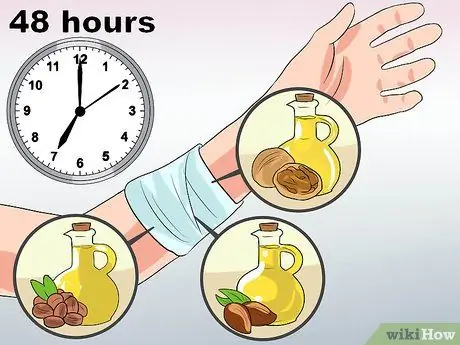
Step 1. Do a product test first
This is important, especially if it's your first time using essential oils because you need to make sure you don't have an allergy to them. To perform a product test:
- Mix three drops of the oil you will be using with teaspoon (3 ml) of a carrier oil such as jojoba, almond, or walnut oil.
- Pour a few drops of the mixture onto the inside of the arm, just below the elbow. Cover the area with plaster.
- Leave the tape on and do not rinse the covered area for 48 hours. After that, remove the plaster and check for irritation such as skin redness, itching, blistering, or swelling. If these symptoms do not appear, you do not have an allergy to the oil used so the oil is safe to add to shampoo.
- Some essential oils should not be used by children under 5 years of age, including basil, cinnamon, lemongrass, thyme, bergamot, nutmeg, peppermint, rosmarin, and saga oil.
- Be careful not to get the oil in your eyes as it can cause irritation.
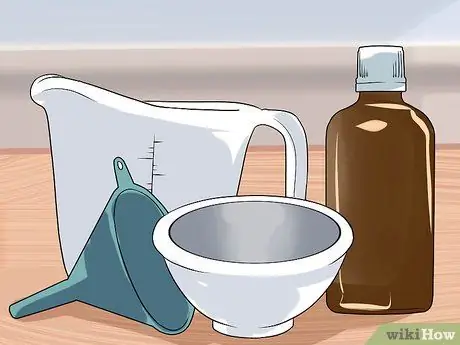
Step 2. Gather the required supplies
In order to add essential oils to your shampoo, you'll need a few supplies in addition to the shampoo and essential oil of your choice. Prepare measuring cups, funnels, small bowls, and dark-colored glass or plastic bottles with tight-fitting lids.
- Store the shampoo and essential oil mixture in a dark bottle with a tight lid because light, heat, and oxygen can damage the aroma and oil content.
- Always put the cap back securely on the bottle after you've used essential oils or shampoos.
- Some essential oils sold in concentrate form can damage plastic. Therefore, you should store the oil concentrate or mixture thereof in a glass bottle.
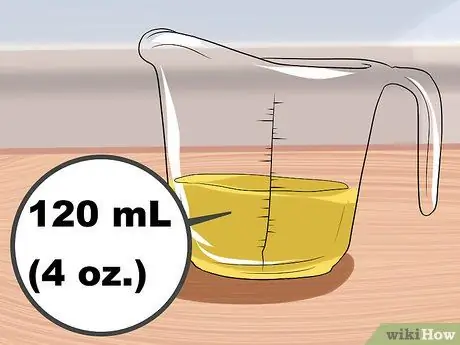
Step 3. Measure out the shampoo to be used
As a guide, use 20 drops of essential oil for every 120 ml of shampoo. Measure out the shampoo and pour it into the bottle. Before putting the shampoo into the bottle, attach the funnel to the mouth of the bottle so that the shampoo doesn't spill or drip onto the floor.
- If you haven't tried this experiment before, use 120 ml of shampoo first in case you don't like the smell or effect of the selected oil.
- If you want to use a full bottle of shampoo, look at the total volume (in millimeters) of shampoo contained in the bottle to see how much oil you need (in drops). You can add the oil directly into the shampoo bottle if you use the same oil for the entire shampoo.
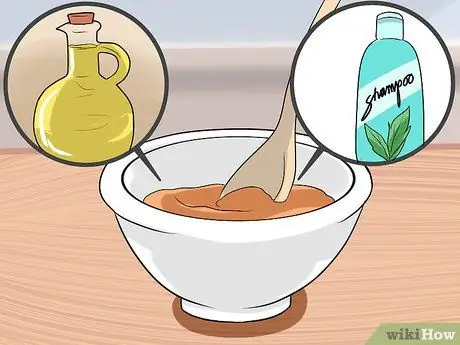
Step 4. Mix the oil
Take a small bowl and mix different types of essential oils (20 drops in total). You can also add 20 drops of the same oil if you want. Stir the oil with a spoon or tilt and turn the bowl to mix the oil, then smell the oil combination.
Don't forget to add the amount of oil used based on the quantity of shampoo. Usually, bottled shampoos sold in the market have a net volume of 350-480 ml. If you want to add oil to a full bottle of shampoo, you will need 60-80 drops of oil
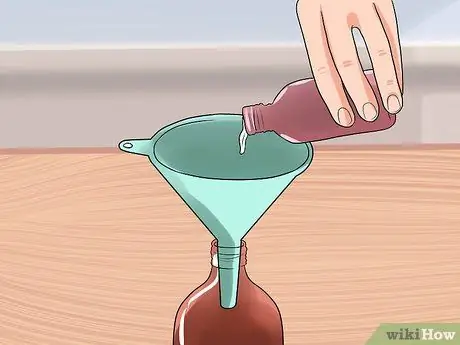
Step 5. Add oil and stir
Once satisfied with the results of the oil mixture, pour the mixture into a bottle that already contains shampoo. Use a funnel to prevent the oil from spilling or dripping onto the floor as you pour it.
- Toss the oil with the shampoo if you have a long, small stirring stick or spoon that fits into a bottle. Otherwise, just shake the bottle carefully.
- Always shake the shampoo before use so that the oil is evenly mixed with the rest of the shampoo.
Part 2 of 3: Choosing the Right Oil
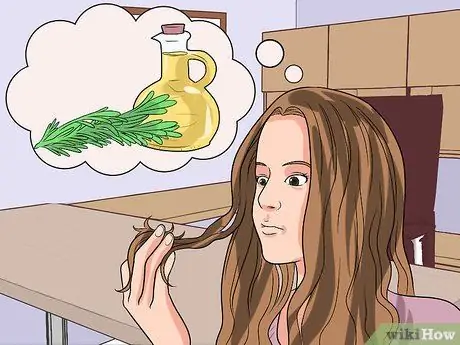
Step 1. Choose essential oils for normal hair
Essential oils have a variety of fragrance and content. Some types of oil are better suited for treating different hair types and problems than others. If you have normal hair that doesn't dry out or is too oily, some of the best essential oils to try include:
- Rosmarin
- lavender
- Geranium
- Lemon
- Clary Sage
- Cedarwood (cedarwood)
- Thyme
- Chamomile
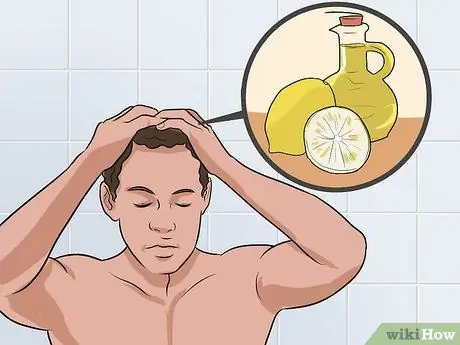
Step 2. Treat oily hair
There are various types of essential oils that are suitable for oily hair because they can slow down oil production or cleanse the scalp of oil more effectively. If you have oily hair, experiment with oils like:
- Lemongrass
- Memories (ylang-ylang)
- cedar wood
- Lemon
- tea tree
- Rosmarin
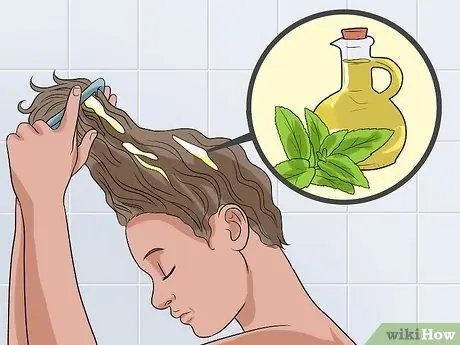
Step 3. Handle dry hair
This hair type is characterized by frizzy hair, split ends, and dullness. This condition can be caused by a lack of oil from the scalp, serious damage from grooming or styling, and excessive use of heat sourced styling tools and styling products. Restore lost moisture to hair with oils such as:
- Geranium
- lavender
- Rosmarin
- Sandalwood (sandalwood)
- cedar wood
- Peppermint
- tea tree
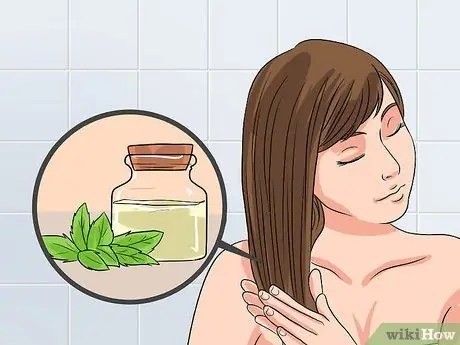
Step 4. Choose essential oils to get rid of mild dandruff
Dandruff can be caused by many things, but there are several types of essential oils that can treat mild dandruff and itchy scalp. These oils include:
- tea tree
- Thyme
- Rosmarin
- lavender
- Eucalyptus
- cedar wood
- Memory
Part 3 of 3: Mixing Oil
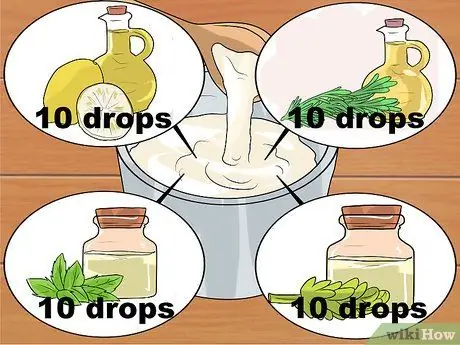
Step 1. Make a toning oil mixture for damaged hair
Regardless of issues like dry hair, dandruff or a flaky scalp, or damaged hair, you can make a mixture of essential oils to add to your shampoo. This mixture can moisturize and nourish hair, and eradicate dandruff. Some recipes to try include:
- Mix lemon, rosemary, tea tree, and lavender oils (10 drops each) with 300 ml of shampoo.
- Mix 20 drops of clary sage oil and (each) 15 drops of wild orange and lavender oil with 240 ml of shampoo.
- Mix lavender, cedar, rosemary, and peppermint oils (10 drops each) with 240 ml of shampoo.
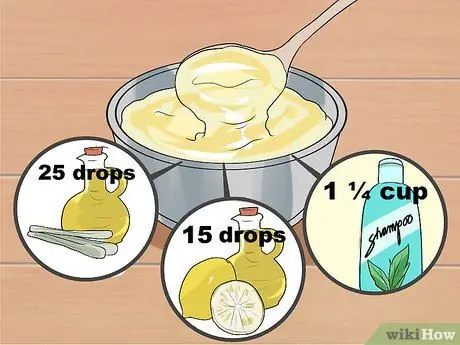
Step 2. Choose an oil to scent your hair
Most essential oils have an impressive aroma. However, the process of mixing these oils is sometimes quite complicated. Some essential oils that are good for hair and have a sweet fragrance include basil, bergamot, lavender, reminiscence, and min. For a fragrant essential oil blend that promotes healthy hair, try:
- Mix 25 drops of lemongrass oil, 10 drops of lemon oil, and 15 drops of lavender oil with 300 ml of shampoo.
- Mix 30 drops of wild orange oil and 20 drops of lavender oil with 300 ml of shampoo.
- Mix 30 drops of lavender oil and 20 drops of peppermint oil with 300 ml of shampoo.
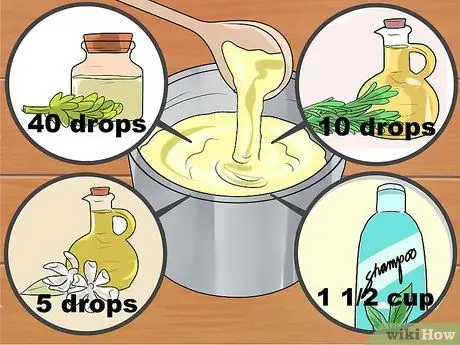
Step 3. Make an all-purpose essential oil mixture
There are several types of versatile essential oils that are useful for a variety of hair treatments, and are suitable for all hair types. These oils include rosemary and lavender oils. To make a fragrant and healthy essential oil mixture, you can mix:
- 40 drops lavender oil
- 10 drops of rosemary oil
- 5 drops of memory oil
- 360 ml shampoo






